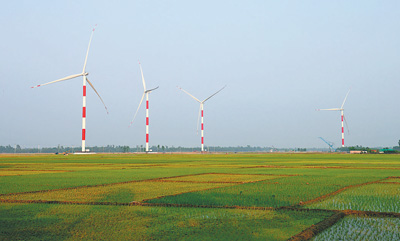Chinese-built wind power project in Bangladesh provides bright prospects for clean energy cooperation
Since its entry into operations last October, a Chinese-built wind power project in Bangladesh, which is also the country's first centralized wind power project, has helped ensure stable and reliable power supply, and underpin the economic development of Bangladesh's southeastern Cox's Bazar district, according to Kader Goni, executive engineer of the Bangladesh Power Development Board.

Photo shows the Cox's Bazar wind power project in Bangladesh. [People's Daily/Bai Yuanqi]
As a tourist destination, Cox's Bazar attracts large numbers of visitors every year, Goni said, noting that before the wind power project was connected to the grid, besides local hotels, restaurants and other major power consuming facilities, local households faced power supply instability and insufficiency.
The wind power project in Cox's Bazar district can meet the electrical demand of about 100,000 households, Goni said.
With a total installed capacity of 66 megawatts, the project has provided more than 25 million kilowatt-hours (kWh) of clean electricity for the locality.
Wuling Power Corporation Ltd., a subsidiary of China's State Power Investment Corporation Ltd. (SPIC), invested in the project, which was built by the PowerChina Chengdu Engineering Corporation Ltd.
The project is expected to generate around 145 million kWh of clean electricity per year for Bangladesh, which is equivalent to a reduction of about 45,000 tonnes in coal consumption, and over 100,000 tonnes in carbon dioxide emissions, according to reliable sources.
Workers are wrapping up the final construction tasks of the project, according to Yin Bobo, chief safety officer of the Wuling Power Bangladesh Business Department.
During the just-concluded Chinese Lunar New Year holiday, or the Spring Festival holiday, Chinese and Bangladeshi workers of the project stuck to their posts and enjoyed a good number of activities to celebrate the festival, which has helped forge a closer bond between the workers of the two countries, according to a Bangladeshi engineer named Abdullah Arif.
Arif, who studied electrical engineering at China Three Gorges University in central China's Hubei Province, is mainly responsible for the project’s equipment maintenance and management. He is one of the local talents the wind power project has nurtured for Bangladesh.
Before officially taking on his job in the project, Arif underwent six months of training in China. According to Arif, the training has made the knowledge he acquired from textbooks more tangible and enabled him to better understand the basic operations.
"I've spent the Spring Festival holiday with my Chinese colleagues over the past two years, and I enjoyed it very much," Arif said.
Yin said he also enjoyed the holiday, despite the fact that he had to remain at the project site in a foreign land.
"We posted Spring Festival couplets, had the traditional New Year's Eve dinner, watched the Spring Festival TV gala, and enjoyed interesting games and football matches together during the holiday. It was an exciting experience," Yin said.
Football matches are held every Friday at the project site, said Imran, the shift in charge of the project, showing People's Daily reporters the football field at the site.
Such matches foster close teamwork and deepen friendships between Chinese and local workers, noted Imran.
"China and Bangladesh enjoy broad prospects for cooperation in the field of renewable energy," said Zhou Yonghong, deputy manager of the Wuling Power Bangladesh Business Department.
According to Bangladesh's strategic plan, Vision 2041, green energy is considered one of the key factors for realizing the dream of "Golden Bangladesh,” said Zhou, explaining that the plan has set a target of 40 percent for the proportion of installed capacity of green energy in the country's overall energy mix.
Billal, the integrated coordinator of the project, said Bangladesh is confident in strengthening cooperation with China in renewable energy development.
During an interview with People's Daily, Billal lauded Chinese technologies and the efficiency of Chinese companies, and noted that Bangladesh is stepping up efforts to increase the share of renewable energy in its energy mix by actively developing wind power resources.
The wind power project in Cox's Bazar district serves as a good example for clean energy development in the future, Billal said.
Praising China's new energy technologies as economical and easy to promote, Goni said the Bangladeshi side looks forward to further strengthening cooperation with China in the field of green energy to boost the development of Bangladesh's wind power industry.
























